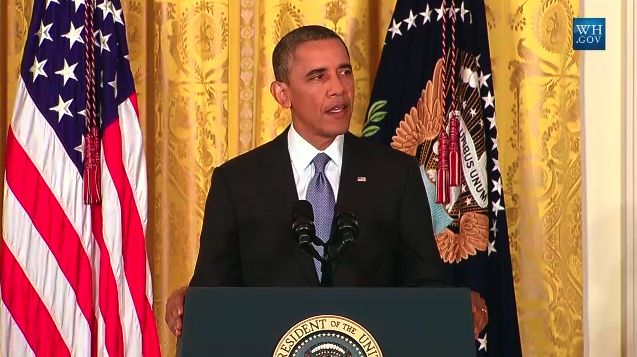Obama lays out surveillance oversight reforms, says Snowden not a patriot
Will reforms be enough for trust?

Sign up for breaking news, reviews, opinion, top tech deals, and more.
You are now subscribed
Your newsletter sign-up was successful
President Obama today laid out four reforms that could lead to greater scrutiny of the country's surveillance programs. He also talked about Edward Snowden, the former government analyst who leaked information on Prism and other NSA programs.
At a White House press conference, Obama stated that given the history of abuse by governments, it's right to ask questions about surveillance, "particularly as technology is reshaping every aspect of our lives."
While he's confident in the government's recently exposed programs, "the American people need to have confidence in them, as well."
It's all about trust
The president said that with the help of Congress, he will work on revising Section 215 of the Patriot Act, which deals with the collection of phone record data from U.S. carriers, though he avoided specifics.
"The scale of the program could cause a worry that it is subject to abuse," he said.
He noted there may be steps that can be taken to ensure U.S. citizens that there are safeguards against abuse, and that greater oversight, greater transparency and greater constraints will be part of the Sec. 215 equation.
The president also proposed reforming the Foreign Intelligence Surveillance Court, which approves the NSA's surveillance requests, so that the side of privacy isn't drowned by a rush towards security. In the vein of transparency, Obama said he has also directed the Department of Justice to release "the legal rationale for the governments collection activities" under Section 215.
Sign up for breaking news, reviews, opinion, top tech deals, and more.
Obama, who explained the reforms grew from conversations with members of Congress and civil libertarians, also outlined one for the establishment of a website to "help people see what the intelligence community does and doesn't do."
A full-time privacy and civil liberties position will be created at the NSA, and at the White House, a "high-level group" will be formed of "outside experts" to review the government's surveillance tactics.
The group will review the government's surveillance technologies, whether abuse of those technologies has taken place, and how the nation's intelligence efforts impact foreign policies. It will issue an interim report in the next 60 days, with a full report due by the end of the year.
"We need new thinking for a new era," Obama said. "We now have to unravel terrorist plots by finding a needle in a haystack of global telecommunications, and meanwhile technology has given governments, including our own, unprecedented capability to monitor communications."
The oversight group will be tasked with considering how the government can maintain trust in the wake of this capability.
On Snowden
Fielding questions from reporters, Obama - considering he just announced a series of reforms seemingly based on the leaks provided issued by Snowden - was asked whether his perception of Snowden has changed from a "hacker" to a whistle-blower, and whether he can be considered a patriot.
The president responded: "No, I don't think Mr. Snowden was a patriot."
The president claimed he called for a review of the country's surveillance operations before Snowden leaked information. This, he suggested, would have been the better way for the surveillance debate to enter the public consciousness.
"My preference, and I think the preference of the American people, would have been for a lawful, orderly examination of these laws; a thoughtful, fact-based debate that would then lead us to a better place," Obama said.
"There's no doubt Mr. Snowden's leaks triggered a much more rapid and passionate response then if I had simply appointed this review board," he continued. "It would have been less exciting and would not have generated as much press.I think we would have gotten to the same place, and we would have done so without putting at risk our national security and some very vital ways that we are able to get intelligence that we need to secure the country."

Michelle was previously a news editor at TechRadar, leading consumer tech news and reviews. Michelle is now a Content Strategist at Facebook. A versatile, highly effective content writer and skilled editor with a keen eye for detail, Michelle is a collaborative problem solver and covered everything from smartwatches and microprocessors to VR and self-driving cars.